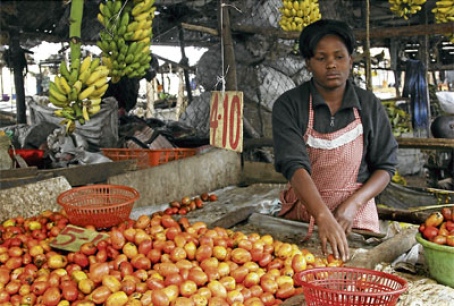The case for people first
Professor Tan Sri Dato' Dzulkifli Abdul Razak
Learning Curve: Perspective
New Sunday Times - 20-5-2012
RESTRUCTURE: The purpose of economies is to first serve the people, not markets
THE 55th Europe Day last week was celebrated in a unique way. A debate on the topic European Union (EU) and Association of Southeast Asian Nations: Markets First or People First? was organised by the EU Ambassador Office, and I was privileged to join the Spanish Ambassador to Malaysia Maria Bassols Delgado in supporting the “people first” proposition.

A vendor waits for customers at a vegetable market in the Kibera slum in Nairobi, Kenya
We took the position that “people first” implies a more humanitarian consideration based on the promotion of human dignity and relationships universally in the pursuit of global peace and sustainability.
In contrast, “markets first” conjures the notion of material wealth creation with little or no consideration for human welfare and the environment, leading to a pessimistic global outlook on an unsustainable future.
Markets as a structure must serve human needs to be relevant to people.
Markets must be subservient to human aspirations since various forms of structure and system are “innovated” by Homo sapiens after all. This has allowed them to exchange their produce long before the term “market” first became fashionable, by offering a range of goods or services (including labour), and more recently, information and knowledge — which are all arguably invented by humans to augment their own civilisation.
To adopt a “markets first” stand is putting the cart before the horse which may be incongruous today where some 60 per cent of the world’s population (about four of the seven billion) are languishing at the bottom of the global economic pyramid.
“There are so much of excesses built up in the economy which needed to be brought down (corrected),” said Graeme Maxton, economist and author of The End Of Progress, during the Asian-Pacific Association of Banking Institutes Regional Conference on May 8-9. He noted that the current economic model that emphasises growth as a goal is “200 years out of date!”.
In fact, reductionist Gross Domestic Product (GDP) too has been challenged as an inadequate measure of how the economy is faring, and too simplistic a method to capture the complexities of the quality of human lives.
Developing and expanding markets without due regard for human dimensions threaten survival as a result of an economic binge that will destroy people, the planet and the balanced prosperity that everyone is entitled to.
The overarching purpose of EU and Asean is more than just chalking up numbers, as in the case of GDP and economic “productivity”, at the expense of building relationships between people and their environment in intergenerational terms in pursuit of a larger human interest and “happiness” beyond momentary “monetary” gain.
Today, the majority of the world population still suffer from poverty, inequality and the threat of climate chaos as a result of the “markets first” ethos. It has created a financial and economic model fuelled by increasing greed and widening disparities in society.
When market aspiration is allowed to reduce people to mere human capital governed by economic proxies for the benefit of a few, it is not surprising that it results in untold loss.
A case in point is the Berlin Conference of 1884 which paved the way for European trade in Africa and literally divided up the continent to colonise it, which created artificial states that lacked any cultural, linguistic or ethnic coherence which is still visible today.
It ended up in rampant exploitation of the continent with economies deliberately designed for European markets, not products for local people.
Until today, Africa is still paying the price with human lives as a consequence of the European markets scramble. Yet similar notions of dividing up the world continues, albeit in a more subtle way.
The Group of 8, or more recently, the Group of 20 meeting of leaders has alienated the majority of the world’s population in its deliberations that further market ambition through the economic system of greed.
It is time to reassert that the real purpose of markets and economies is to first serve the people, and not slavishly do the reverse, if life is to be celebrated in a dignified way.
This is more so in areas where abject human suffering has been the subject of inhuman market intrigues based on an economic model that has turned toxic!
- The writer is the vice-chancellor of Albukhary International University
